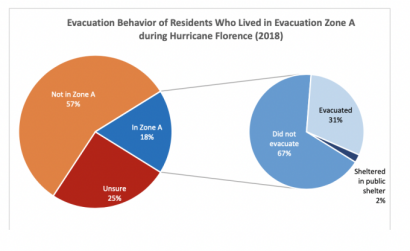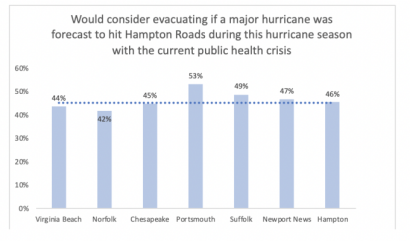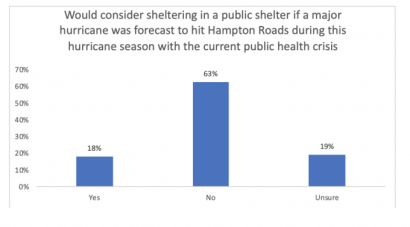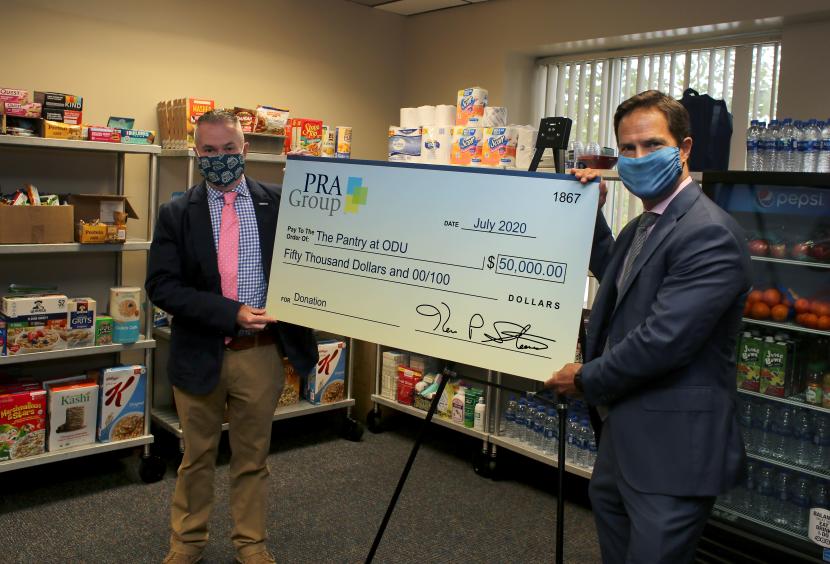If a severe weather event hits Hampton Roads during the 2020 hurricane season, residents say they are less likely to go to public shelters or evacuate relative to previous hurricane seasons.
Concerns about increased COVID-19 exposure when either using a public shelter or evacuating appears to be decreasing propensity of families to get out of harm's way. In addition, as financial resources are required to evacuate, the job loss and economic uncertainty stemming from COVID-19 also appear to be impacting the likelihood that families will evacuate.
This means that, potentially, more people may remain in areas at risk of flooding during this compound pandemic-hurricane threat season relative to previous seasons.
These are two of the key findings from the latest Life in Hampton Roads (LIHR) Survey conducted by Old Dominion University's Social Science Research Center (SSRC).
This study of attitudes about hurricane evacuation and sheltering and the pandemic is part of the 11thannual LIHR Survey, which is designed to gain insight into residents' perceptions of the regional quality of life as well as other topics of local interest.
Here are the survey details:
Sample Size
A total of 1,105 online surveys were completed between June 26 and July 13 (during Phase 2 and Phase 3 of Virginia's reopening plan). Of these, 1,100 are residents of the seven Hampton Roads cities included in the Life in Hampton Roads survey and constituted the final dataset.
Methods
It is important to note that the methodology this year differs from previous Life in Hampton Roads surveys. For several reasons, including COVID-19 social distancing guidelines and telework directives, we moved from a telephone survey to a web-based design using two panels of respondents. This change limits to some degree the ability to compare this year's results with those from previous years or to as confidently generalize the results to the Hampton Roads population as a whole. Nonetheless, we note that an increasing number of surveys have moved online in recent years, and that in many instances useful data has been developed despite the challenges of online survey research. For more detailed information on the methodological changes and potential impacts please see the methodology section in the pending full report or contact the SSRC directly.
Hurricane Evacuation & Sheltering During COVID-19
The 2020 Life in Hampton Roads (LIHR) survey includes several questions concerning how residents plan to prepare for and respond to hurricanes during the COVID-19 pandemic.
The survey results are particularly relevant given Hampton Roads' recent experience with Hurricane Isaias as we enter into what is forecast to be an extremely active hurricane season.
People generally make decisions on how to prepare for and respond to hurricanes based on the track and category of the storm, and in preparation may consider sheltering in their home, sheltering at a local shelter or evacuating from areas perceived to be at greater risk.
To give context, prior to the current hurricane season, 18% of survey respondents lived in Evacuation Zone A during Hurricane Florence in 2018. Of those respondents, despite a mandatory evacuation order, roughly 66% did not evacuate, 30% evacuated and 4% went to a public shelter.
This year's survey data offers evidence of shifting risk perceptions and possibly changes in hurricane evacuation and sheltering behavior under the consideration of potential exposure to the COVID-19 virus.
For example, if a major hurricane is forecast to hit Hampton Roads during this hurricane season, over half (55%) of survey respondents report they would not consider evacuating (29%) or were unsure about evacuating (26%).
In addition, a sizable majority would not consider (63%) or were unsure if they would go to a public shelter (19%). Among those residents who say they would not seek shelter, 70% cite concerns about potential exposure to COVID-19.
Further, researchers find that, for some, the impact of COVID-19 contributes to a lack of resources to evacuate. For example, among those residents who say they would not evacuate, 30% cite not having enough cash or credit on hand to cover expenses associated with evacuation (e.g., food, fuel and shelter). Of those residents who would not evacuate partly due to lack of cash or credit, 17% also reported having been laid off, furloughed or had work hours reduced because of COVID-19 conditions, and 46% reported others in their household had been laid off, furloughed or had work hours reduced because of COVID-19.
Furthermore, of those respondents who do not plan to evacuate because of resource constraints, only 19% would consider going to a public shelter. This finding points to potential disparities in ability of low-to-modest income households across our region to evacuate.
Importantly, responses to this year's survey can be contrasted to illustrate differences to pre-COVID-19 responses. For example, survey data can be used to compare how vulnerable residents (living in Evacuation Zone A) responded during Hurricane Florence in 2018 and how they plan to respond to a hurricane in 2020. That is, of those respondents who lived in Evacuation Zone A and evacuated during Hurricane Florence, 72% would consider evacuating in the 2020 hurricane season during COVID-19 and 50% would consider evacuating to a public shelter.
In contrast, among those who evacuated to a public shelter in 2018, only 39% would consider evacuating and 61% would consider going to a public shelter during the current hurricane season. Of those who did not evacuate during Hurricane Florence, less than half (44%) would consider a similar response (not evacuating) in 2020, and only 11% would consider going to a public shelter.
The implications stemming from these potential shifts in behavior witnessed in the current survey are significant. With fewer residents expected in public shelters and fewer residents planning to evacuate, there may be more people remaining in areas at risk of flooding during a severe storm.
In addition to 2020 LIHR survey data, ODU researchers (Joshua Behr, Wie Yusuf, Nicole Hutton and Jennifer Whytlaw) have also conducted analysis of evacuation and sheltering issues associated with the compound hurricane-pandemic threat through workshops with federal, state, local, nonprofit and research stakeholders from across the country. Contact Behr (jbehr@odu.edu) for more information.
Related News Stories
Life in Hampton Roads: COVID-19 and Education
The 11th annual survey by ODU’s Social Science Research Center kicks off with Hampton Roads residents weighing in on closing and reopening schools and the quality of remote learning. (More)
Life in Hampton Roads: Politics, Policy and COVID-19 Response
Overall and on most issues the public was quite divided, with divisions often falling along party lines. But President Trump and the CDC seemed to elicit the strongest negative and positive responses, respectively. (More)
Monarch Pantry Receives $50,000 Donation from Norfolk-Based Company
Don Stansberry, interim vice president of SCL, says the funding “will help our new pantry provide nutritional food for many ODU students.” (More)









